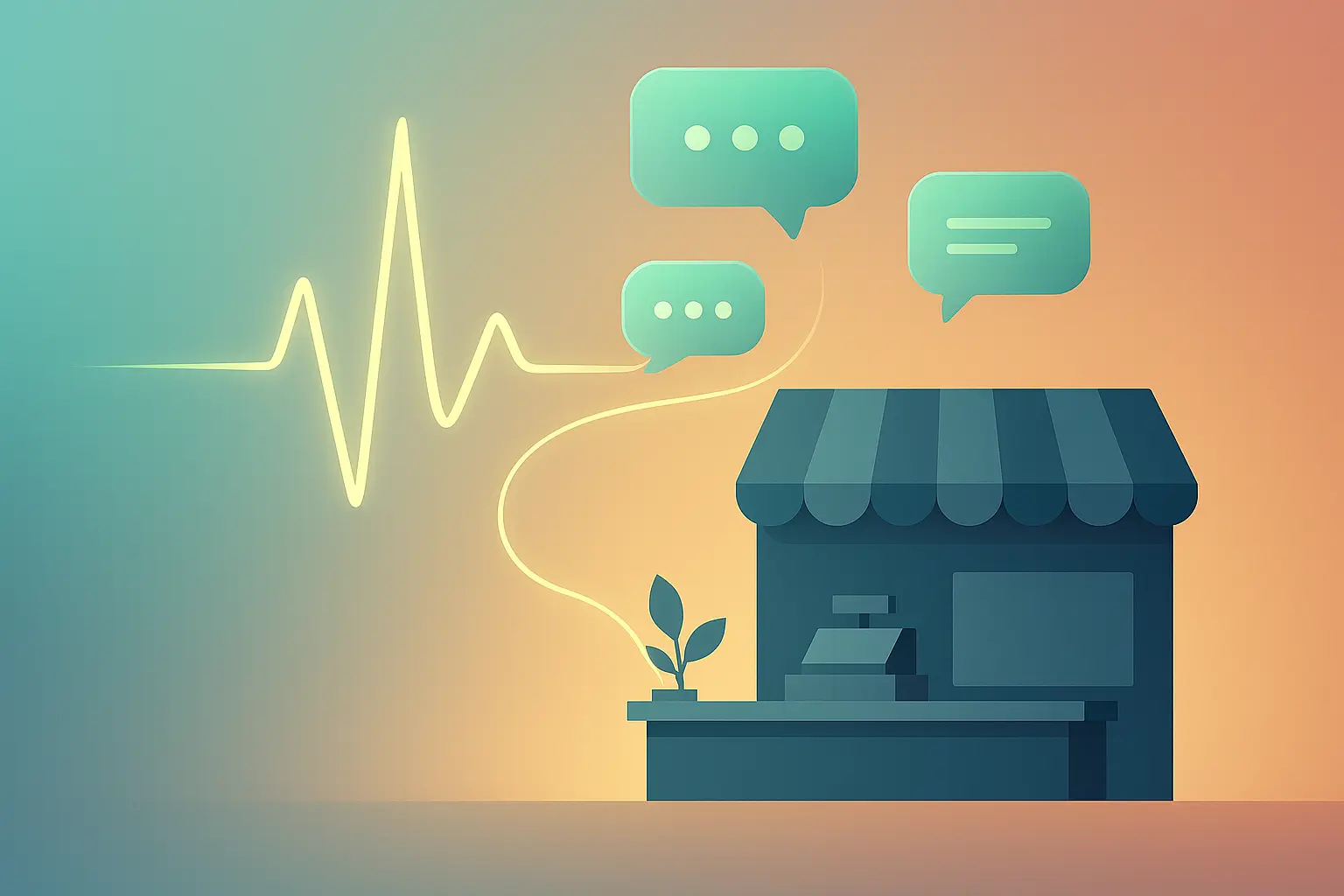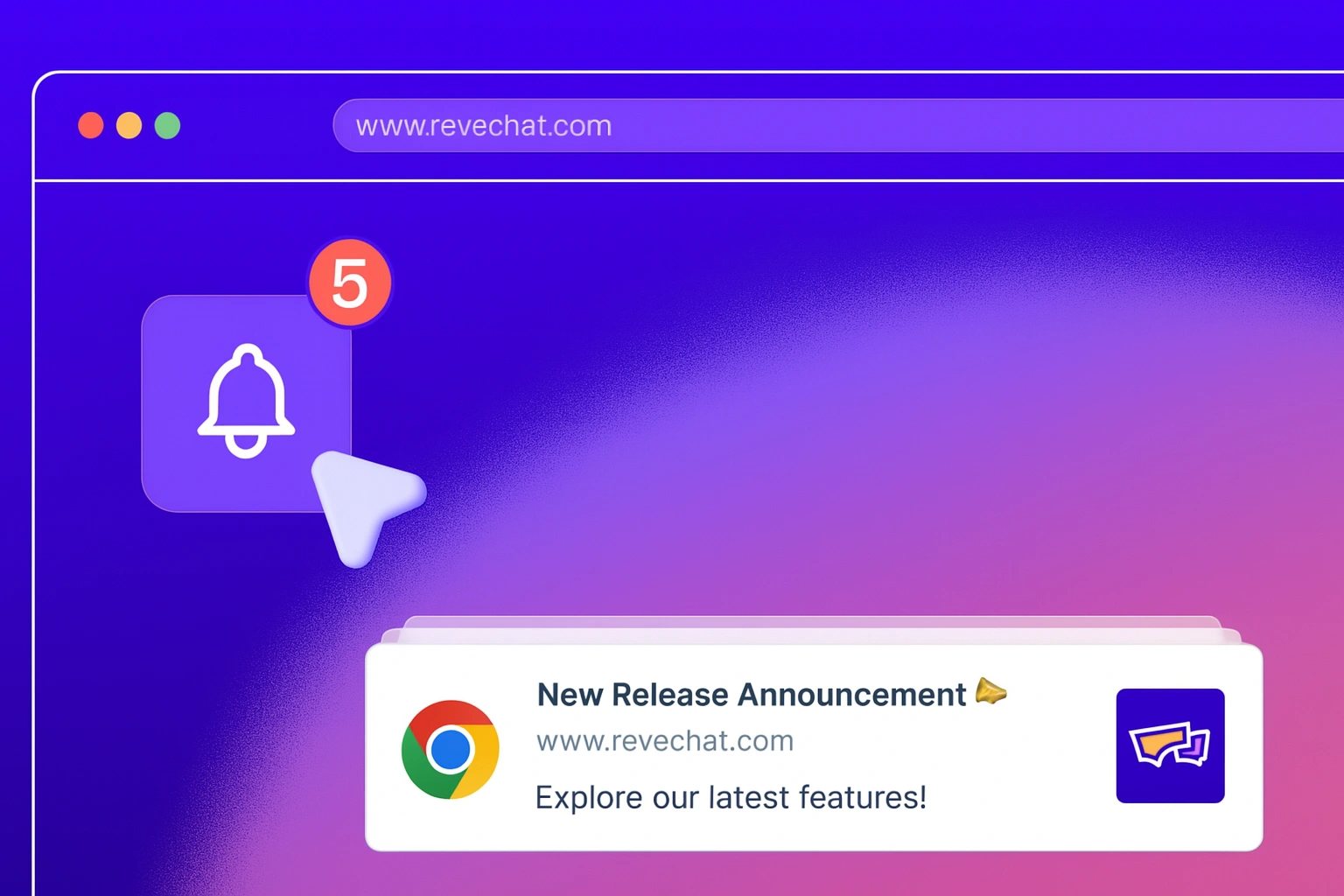E-commerce Chatbot Use Cases & Examples
- October 29, 2024
- 8 mins read
- Listen
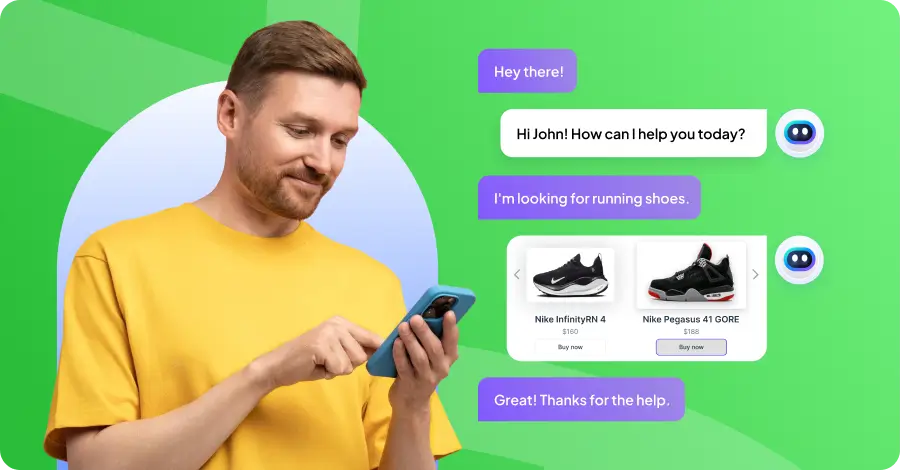
Keeping up with customer demands for instant support and personalized experiences is tougher than ever. With over 2 billion people shopping online, even top support teams struggle to handle the volume of inquiries.
Studies show that 69% of consumers prefer chatbots for quick answers and 64% of online shoppers value 24/7 availability, it’s clear that traditional customer service models often fall short in the constantly shifting e-commerce world. E-commerce Chatbot, this intelligent virtual assistant can help customers shop, answer FAQs, and more.
If you’ve been trying to find answers to what e-commerce chatbots are, their use cases, and examples look no further.
What is an E-commerce Chatbot?
An e-commerce chatbot is an AI-powered tool that helps to communicate with customers through natural, human-like conversations on an online store or website. These chatbots are designed to interact with customers through natural language processing (NLP) to understand and respond to queries, assist in product recommendations, and offer a seamless shopping experience.
6 Best E-commerce Chatbot Use Cases
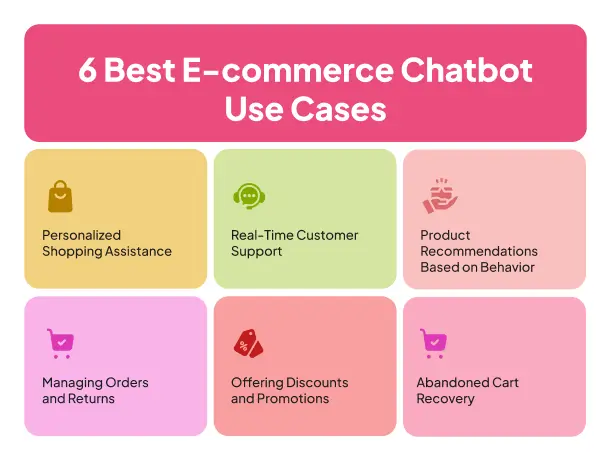
E-commerce chatbots have transformed the way businesses interact with their customers. It offers versatile solutions to e-commerce businesses. It helps with customer engagement, and customer acquisition and drives sales. To illustrate how impactful these AI-powered tools can be, let’s see the most effective use cases, backed by real-world examples that show their true potential.
1. Personalized Shopping Assistance
You have an eCommerce business and your customers often feel overwhelmed by the vast number of products in your store. They struggle to find the right product that fits their preferences, style, or needs. An AI-powered chatbot can act as a personal shopping assistant. It offers personalized recommendations based on customer preferences, browsing history, and previous purchases.
It can guide your users through a series of questions to understand their preferences. By asking targeted questions about product categories, sizes, styles, or price ranges, the chatbot narrows down options and recommends products tailored to the shopper’s needs. This personalized guidance simplifies the shopping journey and increases the chances of conversion.
For example, a customer looking for shoes. And s/he is perplexed how to find it. A Chatbot can guide the customer by asking about shoe size, preferred style (casual, formal, athletic), and even usage (e.g., running, hiking, office). The chatbot suggests relevant options based on the answers, complete with reviews and price comparisons.
2. Real-Time Customer Support
Customers often have questions during the shopping process, such as product availability, shipping policies, or return procedures. Waiting for a response from a human agent can lead to frustration and cart abandonment.
You can solve this issue with an eCommerce chatbot. For example: with REVE chatbot integrated into your website, you can provide real-time customer support and can instantly answer frequently asked questions. Such as product details, delivery times, and return policies. It can even provide detailed information about stock availability or size guides to help shoppers make informed decisions quickly, reducing the chances of cart abandonment.
Suppose a shopper asks, “When will this item be back in stock?” The chatbot instantly responds with an estimated restock date or recommends similar products available in the same category.
3. Product Recommendations Based on Behavior
Customers often browse products without a clear idea of what they need, leading to decision fatigue. Generic recommendations don’t always align with their preferences, making the shopping process inefficient.
Chatbots equipped with AI and machine learning can analyze browsing behavior and previous purchase history to recommend products that align with the shopper’s preferences. These personalized recommendations keep the user engaged and increase the likelihood of purchase.
A customer who previously purchased a laptop is recommended accessories like cases, external hard drives, and keyboards by the chatbot based on their browsing behavior and purchase history.
4. Managing Orders and Returns
Tracking an order or initiating a return can be a tedious process for customers, often requiring them to navigate through multiple pages or wait for support from customer service agents.
A chatbot can streamline the process by providing real-time updates on orders, such as tracking details or estimated delivery dates. It can also automate the return process, guiding customers through steps for returning items and providing instant return labels.
A customer asks, “Where is my order?” and the chatbot provides real-time tracking information with an estimated delivery time. If a return is needed, the bot walks the customer through initiating the return and provides instructions for packaging and shipping the item.
5. Offering Discounts and Promotions
Customers may not be aware of ongoing sales or may forget to apply discount codes during checkout, leading to missed opportunities for savings.
A chatbot can proactively offer discount codes, flash sale notifications, or personalized promotions based on the user’s browsing history or cart contents. By delivering these in real-time, chatbots ensure that customers make the most of promotions without needing to search for offers manually.
A chatbot detects a user browsing dresses and offers a 10% discount code specifically for that category, encouraging the user to complete their purchase.
6. Abandoned Cart Recovery
Shopping cart abandonment is a common issue in e-commerce, often due to distractions or uncertainty about purchasing decisions. Many businesses lose revenue when customers leave without completing their transactions.
An AI-driven chatbot can identify when a user has abandoned their cart and send a follow-up message to remind them of their pending purchase. The chatbot can also address any concerns, such as providing additional information on shipping, offering a discount, or resolving issues like expired payment methods.
A customer leaves items in their cart without completing the purchase. The chatbot sends an automatic message, “Need help completing your order?” offering a small discount or providing shipping information to encourage the customer to finalize their transaction.
Examples of Businesses Using an E-commerce Chatbot
You must be wondering what an eCommerce Chatbot looks like and how it actually helps an eCommerce platform, right? Let me give you an example of a company that is using an e-commerce chatbot to increase its ROI.
Le REVE: Enhancing Customer Support
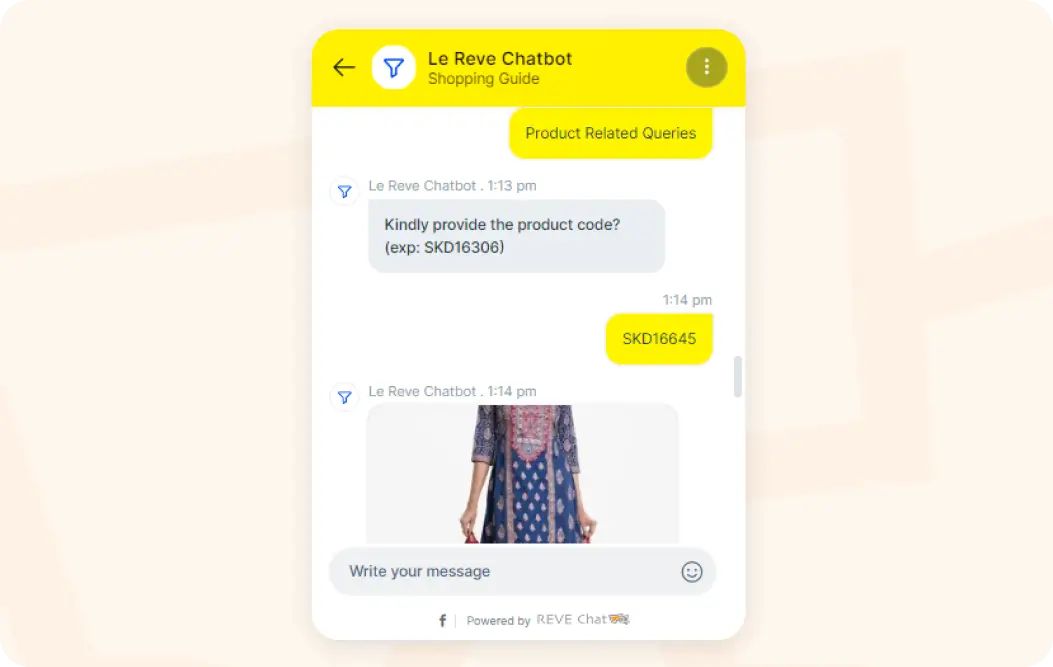
Le REVE is an eCommerce platform that uses REVE Chatbot to help its customers to:
- Assist with product search, order tracking, and store locations.
- Combines typed requests and button options for a seamless chat experience.
- Chatbot is available 24/7, ensuring support even outside business hours.
Le REVE is gaining customer engagement, acquiring new customers, and driving sales:
Boosting Customer Engagement
Le REVE actively engages customers through personalized experiences. With the chatbot and live chat features, it offers quick responses, personalized recommendations, and interactive shopping assistance. This keeps customers engaged throughout their shopping journey.
Acquiring New Customers
The Chatbot reaches and attracts new customers. It guides first-time visitors, provides product suggestions, and answers questions instantly. This seamless experience helps convert casual browsers into loyal customers.
Driving Sales
Le REVE’s chatbots are designed to drive sales by offering product recommendations and upselling based on customer behavior. The brand also uses forms to capture leads and schedule appointments. These help turn interest into direct sales.
H & M: Shopping Assistance
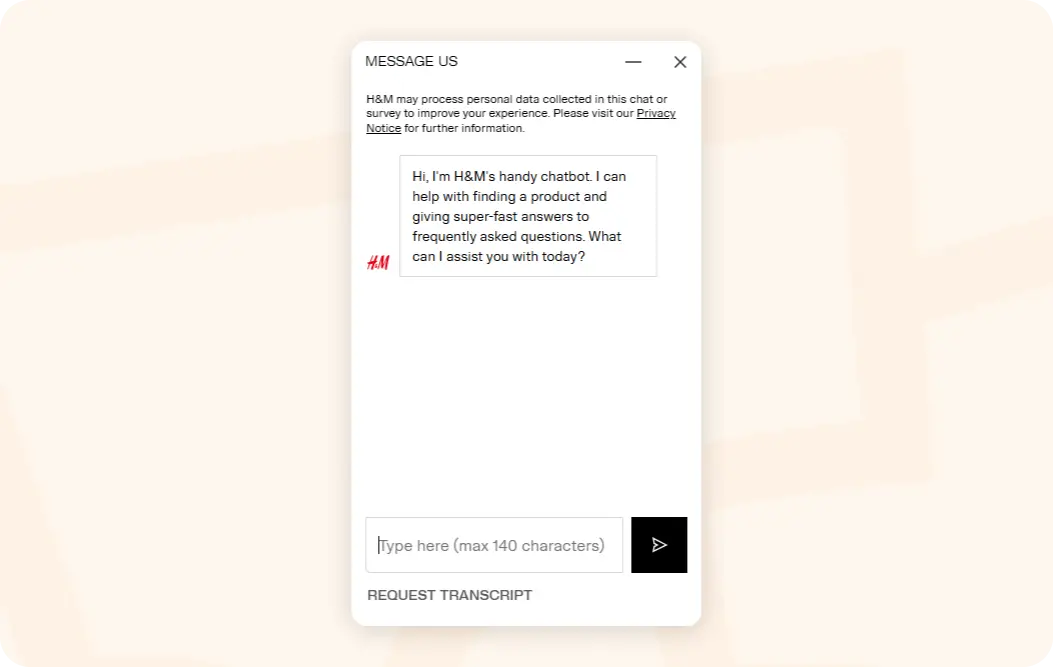
H&M’s started using an eCommerce chatbot that is like a personal shopping assistant, always ready to help. They named the chatbot Handy. It offers style tips based on what you like, making the shopping journey feel more personalized.
It gives instant answers and recommendations, Handy helps customers shop with confidence, reducing cart abandonment and keeping the experience smooth and frustration-free. It’s a win-win for shoppers and H&M!
Conclusion
E-commerce chatbots offer a powerful solution to meet growing customer demands. They provide 24/7 support, personalized shopping experiences, and automate tasks like order tracking and cart recovery. As online shopping expands, chatbots help businesses engage customers, drive sales, and reduce costs.
Our chatbot solution is built for e-commerce businesses like yours, so learn more about our intuitive solution by signing in and start using REVE Chat’s AI-powered chatbot today!
Frequently Asked Questions
An e-commerce chatbot is an AI-powered tool designed to interact with customers on e-commerce websites or platforms. It helps automate various customer interactions, provides instant responses to queries, guides users through product selections, and assists with the shopping process.
Yes, chatbots are widely used in e-commerce to enhance customer experiences by recommending products, answering questions, guiding users through checkout, offering personalized promotions, and automating customer service tasks like order tracking and refunds.
Bots improve e-commerce by offering instant customer support, increasing conversion rates, and providing personalized product recommendations. They reduce operational costs by automating tasks and enhancing customer engagement with 24/7 availability, leading to higher satisfaction and sales.
To use e-commerce chatbots, businesses can automate customer support, provide product recommendations, assist with order processing, and offer personalized promotions. Shoppers can ask product questions, get recommendations, track orders, and resolve issues. Chatbots enhance the shopping experience by offering 24/7 assistance and personalized interactions.
AI is used in e-commerce for personalized product recommendations, dynamic pricing, chatbots for customer support, inventory management, fraud detection, and analyzing customer behavior to improve marketing and sales strategies.


